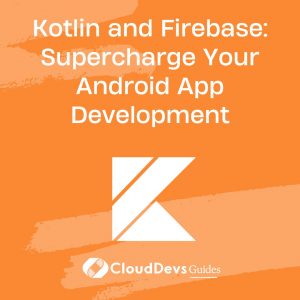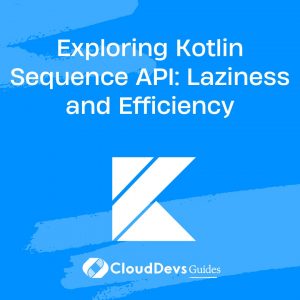Kotlin and Firebase: Supercharge Your Android App Development
In today’s fast-paced world, mobile app development has become an essential part of every business’s strategy. Android, being one of the most popular mobile platforms, offers a vast user base and tremendous opportunities for developers. However, building robust and feature-rich Android apps can be a challenging task. That’s where Kotlin and Firebase come in. In this blog post, we’ll explore how the combination of Kotlin and Firebase can supercharge your Android app development and provide you with a seamless development experience.
Why Kotlin?
Kotlin, developed by JetBrains, is a modern and statically-typed programming language for the Java Virtual Machine (JVM). It offers numerous advantages over Java, making it a popular choice for Android app development. Some key reasons why Kotlin is gaining momentum are:
- Interoperability with Java: Kotlin is fully interoperable with Java, allowing developers to use existing Java libraries and frameworks seamlessly.
- Conciseness and Readability: Kotlin’s concise syntax and enhanced readability make it easier to write and maintain code, reducing the chances of bugs and improving productivity.
- Null Safety: Kotlin’s null safety features help eliminate null pointer exceptions, a common source of crashes in Android apps.
- Coroutines: Kotlin provides native support for coroutines, making asynchronous programming more straightforward and more efficient.
What is Firebase?
Firebase is a comprehensive platform by Google that provides various tools and services for building mobile and web applications. It offers a wide range of features, including real-time databases, authentication, cloud messaging, hosting, and more. Firebase simplifies the backend infrastructure and allows developers to focus on building the app’s core functionality rather than worrying about server-side maintenance and scalability.
Benefits of Using Kotlin and Firebase Together
The combination of Kotlin and Firebase offers several advantages for Android app development:
- Seamless Integration: Kotlin and Firebase are designed to work together seamlessly. Kotlin’s interoperability with Java makes it easy to integrate Firebase SDKs into your Android project.
- Rapid Development: Kotlin’s concise syntax and Firebase’s ready-to-use features accelerate the development process, enabling you to build apps faster and more efficiently.
- Real-time Communication: Firebase’s real-time database and cloud messaging capabilities enable real-time updates and messaging in your app, enhancing the user experience.
- Scalability: Firebase’s scalable infrastructure handles the backend complexity, ensuring your app can handle large user bases without compromising performance.
- Analytics and Crash Reporting: Firebase provides powerful analytics and crash reporting tools, giving you valuable insights into user behavior and app performance.
Setting Up Your Android Project with Kotlin and Firebase
To get started with Kotlin and Firebase, follow these steps:
- Create a new Android project in Android Studio.
- Configure Kotlin in your project by adding the Kotlin Gradle plugin to your project-level build.gradle file.
- Add the Firebase SDK dependencies to your app-level build.gradle file.
- Connect your app to Firebase by following the Firebase setup wizard in the Firebase console.
- Download and add the google-services.json file to your Android project.
Firebase Authentication with Kotlin
Firebase Authentication simplifies the user authentication process in your Android app. With Firebase Authentication and Kotlin, you can easily implement features like email/password authentication, social media login, and more. Here’s an example of how to implement email/password authentication in Kotlin:
kotlin
// Initialize Firebase Authentication
val auth = FirebaseAuth.getInstance()
// Create a user with email and password
auth.createUserWithEmailAndPassword(email, password)
.addOnCompleteListener { task ->
if (task.isSuccessful) {
// User creation success
val user = auth.currentUser
} else {
// User creation failed
val exception = task.exception
}
}
Real-time Database with Kotlin and Firebase
Firebase Real-time Database enables developers to build real-time collaborative features in their Android apps. It uses a NoSQL cloud-hosted database, which synchronizes data across devices in real-time. Here’s an example of how to read data from the Real-time Database in Kotlin:
kotlin
// Get a reference to the database
val database = FirebaseDatabase.getInstance().reference
// Read data from the "users" node
database.child("users").addListenerForSingleValueEvent(object : ValueEventListener {
override fun onDataChange(dataSnapshot: DataSnapshot) {
for (userSnapshot in dataSnapshot.children) {
val user = userSnapshot.getValue(User::class.java)
// Process the user data
}
}
override fun onCancelled(databaseError: DatabaseError) {
// Handle the error
}
})
Cloud Firestore Integration with Kotlin
Cloud Firestore is a flexible, scalable, and document-based NoSQL database provided by Firebase. It offers powerful querying and real-time updates, making it an excellent choice for building modern Android apps. Here’s an example of how to add data to Firestore in Kotlin:
kotlin
// Get a reference to the Firestore database
val db = Firebase.firestore
// Create a new user document
val user = hashMapOf(
"name" to "John Doe",
"email" to "johndoe@example.com"
)
// Add the user document to the "users" collection
db.collection("users")
.add(user)
.addOnSuccessListener { documentReference ->
// Document added successfully
}
.addOnFailureListener { exception ->
// Error adding document
}
Firebase Cloud Messaging in Kotlin
Firebase Cloud Messaging (FCM) enables you to send push notifications to your Android app users. With Kotlin and FCM, you can easily implement push notifications and engage your users effectively. Here’s an example of sending a push notification to a specific device using the FCM API:
kotlin
// Get the FCM token for the device
FirebaseMessaging.getInstance().token
.addOnCompleteListener { task ->
if (task.isSuccessful) {
val token = task.result
// Send the push notification using the FCM API
}
}
Crashlytics and Analytics Integration with Kotlin
Firebase Crashlytics helps you track and analyze app crashes, while Firebase Analytics provides valuable insights into user behavior and app usage. Integrating these services into your Kotlin-based Android app is straightforward. Here’s an example of how to log a custom event using Firebase Analytics:
kotlin
// Log a custom event
val bundle = Bundle().apply {
putString("category", "Button Click")
putString("action", "Login")
}
FirebaseAnalytics.getInstance(context).logEvent("custom_event", bundle)
Conclusion
By combining the power of Kotlin and Firebase, you can supercharge your Android app development process. Kotlin’s modern syntax and features make code more readable and maintainable, while Firebase’s comprehensive suite of services simplifies backend infrastructure management. Whether it’s authentication, real-time databases, push notifications, or analytics, Kotlin and Firebase provide the tools and resources you need to build robust and feature-rich Android apps efficiently. Embrace this powerful combination and take your Android app development to the next level.
Table of Contents









